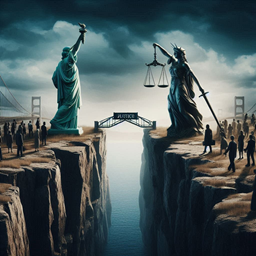by Bender Rize

There are ideas that, like old wounds, never stop aching, no matter how much time passes. One of them is the attempt to reconcile freedom and equality — two values that eternally pull society in opposite directions. Nikolai Berdyaev, a philosopher gifted with the ability to see beyond his time, challenged this dream of harmony in the early 20th century:
“Equality (if understood as more than strictly formal-legal equality) and freedom are incompatible things. Freedom is not democratic but aristocratic. Freedom is neither interesting to nor needed by the rising masses; they cannot bear the burden of freedom. By nature, people are not equal; equality can only be achieved through violence — and it will always be leveling down.”
His words strike like a hammer: to equalize the poor with the rich means taking away the wealth of the rich; to equalize the weak with the strong means depriving the strong of their strength; to equalize the foolish with the intelligent means turning intelligence into a flaw. The result? A society of the poor, the weak, and the foolish, bound together by force.
Berdyaev didn’t mince words, and his thought hits a nerve. It makes you pause and ask: is it even possible to build a world where freedom and equality don’t devour each other? Looking at history, it seems he may have been right. Take Cuba, North Korea, or the Soviet Union in its darkest years. The pursuit of total equality there turned not only into poverty, but into chains for anyone who dared to think differently. Everyone was equal — but equal in poverty, fear, and silence. The state, like a colossal machine, shaved off anything that rose above, until only a gray mass remained. This is precisely the “leveling down” Berdyaev warned about.
But life doesn’t like simple answers. Today, equality is understood differently — not as sameness in everything, but as equality of opportunity, equality before the law, as a kind of social justice. No one (or almost no one) demands that everyone live in the same houses and eat the same porridge. The idea is that everyone should have a chance to rise, whether they were born into an oligarch’s family or in a village without electricity. Social justice means that a person should at least have a minimal standard of living: a roof over their head, food to eat, access to a doctor. Sounds reasonable — but even here, the problem begins.
To give some this “minimum level,” something has to be taken from others. Taxes, redistribution, laws — all this can feel like a noose around the necks of those used to the freedom to manage what’s theirs. One acquaintance of mine, an entrepreneur, once said: “I don’t mind helping, but why should I give away half of what I’ve earned so that someone else can sit and do nothing?” His words echo Berdyaev’s warning: any forced leveling is perceived as an assault on freedom. And here we are again at the same crossroads — how do we find the balance, so we don’t fall into either the chaos of absolute freedom or the tyranny of total equality?
These debates have gone on for years, always hitting the same wall: where do we draw the line? How much redistribution is fair? Some say taxing the rich is theft. Others say that without it, society will fall apart — because poverty breeds envy, and envy leads to revolt. Both sides have a point. But I think the issue goes beyond laws or money. It lies in people’s minds.
If, from childhood, people are taught compassion, respect for others’ labor, and responsibility for their actions, maybe we won’t have to rely on the force of law so often. Imagine a society where people want to help each other — not because they’re forced to, but because it’s part of who they are. Sounds utopian, but many of us have seen such examples: a neighbor who fixes an elderly woman’s fence just because; volunteers collecting food for the homeless; a teacher who spends their evenings helping a struggling student catch up. These are not laws — these are values living inside people.
Berdyaev, of course, was right to warn us against illusions. Absolute equality built on violence is a road to nowhere. But letting everything go and turning a blind eye to those who were less fortunate isn’t the answer either. The modern world is searching for a golden mean: how to give everyone a chance without strangling those who want — and are able — to go further. It’s not about sameness — it’s about dignity, so that each person can live without losing themselves. And maybe the secret isn’t only in the right laws, but in raising people who truly want to make this world a little more just.

